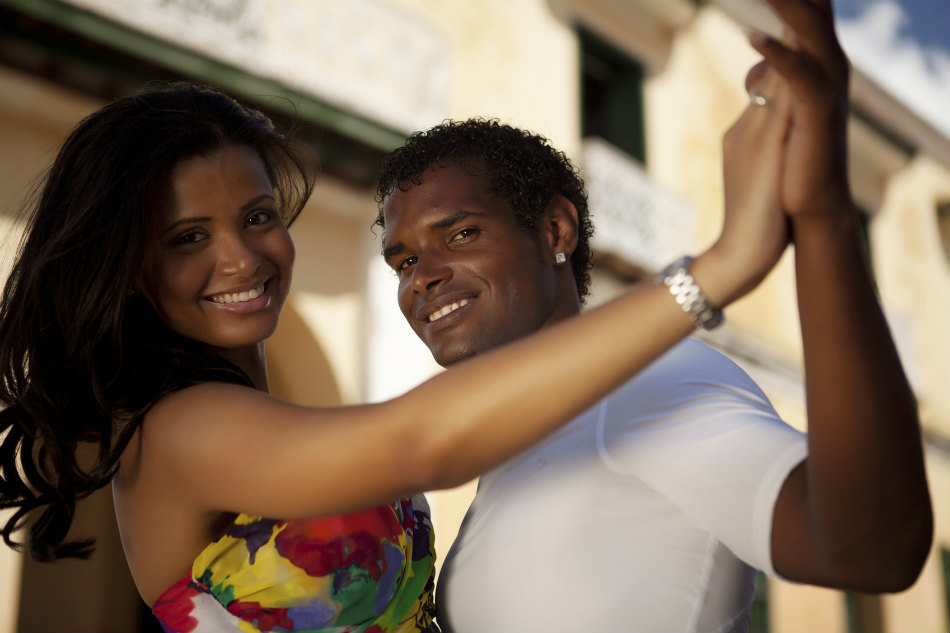Whether it’s your first salsa class or you’re an advanced dancer, the same advice holds true: The best thing you can do for your own practice is to dance with as many different dancers, of all abilities, as possible. However, as an advanced dancer, you have some responsibilities unique to your level. When dancing with a beginner, it’s your job to help guide. After all, you’ve been there/done that. You can guide with your body by holding proper form whether you’re a lead or a follow. You can guide vocally, telling your partner tips or verbally instructing how to complete a move (just keep in mind that there’s a big difference between gentle verbal guidance and barking out orders). If it feels like you’re basically teaching for free, though, it’s time to re-think what dance means.
It’s very rare that you’ll be dancing with someone who’s at the exact same level as you. Your partner may be a little more advanced with some moves, a little less advanced, or you might naturally mesh together in different ways. It’s every dancer’s job to make their partner feel at ease, and this is largely done through responsive “listening.” Listen to what they say, watch their verbal cues, and do your best to help both of you achieve a positive dance experience.
You’ve heard teachers say time and time again that they learn just as much—if not more—from their students than what they teach. Dancing is a learning experience for all. With every dance, and with every partner, you learn more. Yes, sometimes it can be frustrating, especially if all you want is to easily dance with someone who’s near your ability level. However, if you’re dancing with someone who’s not as advanced as you, it’s time to put on your teaching shoes.
Here are some of the best tips from advanced dancers on partnering with a newbie:
- Practice empathy: Put yourself in their shoes. Dancing can be challenging, overwhelming and even intimidating. Everybody, including new dancers, wants an enjoyable and successful dance. Unless it’s very necessary, do your best to bite your tongue and let them tell you how much (if any) advice they want. Instead, practice good dance manners and form yourself. Hold your frame, go to their level as much as you can, and be gracious. Simply showing that you enjoy dancing with them will work wonders to helping you both have a good experience.
- Challenge them slowly: A great dance is one that is both successful and challenging. If you intuit that they’re ready to try a particular move or spin, you can 1) ask them if they’d like to try it and/or 2) help your partner complete a challenging move strongly and slowly so they’re not over-burdened. Whether you’re a lead or a follow, introducing a new move to a partner can be very exciting and rewarding.
- Remember you’re still learning, too: The only thing tougher than learning how to dance salsa is learning how to teach it! Most advanced dancers, regardless of their goals, will spend some of their time teaching. Whether you become a full-fledged instructor, step in from time to time to help out, or simply have beginners reaching out to you for advice, it’s a natural side effect of being a great dancer. However, learning how to teach someone at a very different level than you is a brand new kind of challenge! Embrace it and remember that your partner is teaching you critical skills, too.
- Model good dance etiquette: New dancers look to advanced dancers to see how to act and what good dance etiquette entails. This includes trying to equally dance with all partners when possible, practicing good hygiene, and simply being polite.
- Be generous with compliments: Unless you’re actually a dance instructor, keep that constructive criticism to a minimum. New dancers are already trying to juggle a lot of information, likely from instructors and classes that you’re unaware of. If you’re dancing with them at a club or a studio party, oftentimes all they want to do is practice. Pick at least one strength your partner has and compliment them on it at the end of the dance. It’s a self-esteem boost that might be paramount in their continued dancing.
The better a dancer you become, the more obstacles and responsibilities you’ll face. Embrace them. Remember what it was like to be a brand new dancer, or new to any hobby. It’s scary! You can make a big difference in how confident a new dancer feels, so challenge yourself to welcome them. Being a great dance partner, regardless of your partner’s skill level, is a goal you can set for yourself every time you slip on your salsa shoes.


Leave A Reply